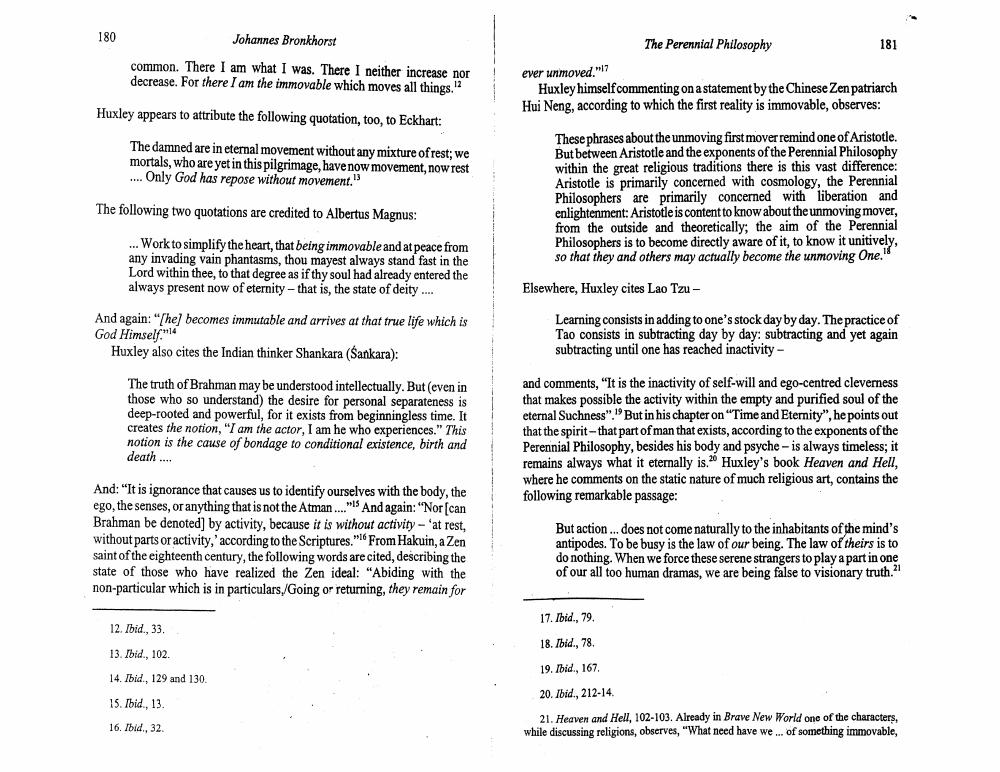Book Title: Perennial Philosophy And Law Of Karma Author(s): Johannes Bronkhorst Publisher: Johannes Bronkhorst View full book textPage 4
________________ Johannes Bronkhorst common. There I am what I was. There I neither increase nor decrease. For there I am the immovable which moves all things.12 Huxley appears to attribute the following quotation, too, to Eckhart: The damned are in eternal movement without any mixture of rest; we mortals, who are yet in this pilgrimage, have now movement, now rest .... Only God has repose without movement." The following two quotations are credited to Albertus Magnus: ... Work to simplify the heart, that being immovable and at peace from any invading vain phantasms, thou mayest always stand fast in the Lord within thee, to that degree as if thy soul had already entered the always present now of eternity- that is, the state of deity.... 180 And again: "[he] becomes immutable and arrives at that true life which is God Himself."4 Huxley also cites the Indian thinker Shankara (Sankara): The truth of Brahman may be understood intellectually. But (even in those who so understand) the desire for personal separateness is deep-rooted and powerful, for it exists from beginningless time. It creates the notion, "I am the actor, I am he who experiences." This notion is the cause of bondage to conditional existence, birth and death.... And: "It is ignorance that causes us to identify ourselves with the body, the ego, the senses, or anything that is not the Atman...." And again: "Nor [can Brahman be denoted] by activity, because it is without activity - 'at rest, without parts or activity,' according to the Scriptures." From Hakuin, a Zen saint of the eighteenth century, the following words are cited, describing the state of those who have realized the Zen ideal: "Abiding with the non-particular which is in particulars,/Going or returning, they remain for 12. Ibid., 33. 13. Ibid., 102. 14. Ibid., 129 and 130. 15. Ibid., 13. 16. Ibid., 32. The Perennial Philosophy 181 ever unmoved."17 Huxley himself commenting on a statement by the Chinese Zen patriarch Hui Neng, according to which the first reality is immovable, observes: These phrases about the unmoving first mover remind one of Aristotle. But between Aristotle and the exponents of the Perennial Philosophy within the great religious traditions there is this vast difference: Aristotle is primarily concerned with cosmology, the Perennial Philosophers are primarily concerned with liberation and enlightenment: Aristotle is content to know about the unmoving mover, from the outside and theoretically; the aim of the Perennial Philosophers is to become directly aware of it, to know it unitively, so that they and others may actually become the unmoving One. Elsewhere, Huxley cites Lao Tzu Learning consists in adding to one's stock day by day. The practice of Tao consists in subtracting day by day: subtracting and yet again subtracting until one has reached inactivity and comments, "It is the inactivity of self-will and ego-centred cleverness that makes possible the activity within the empty and purified soul of the eternal Suchness"." But in his chapter on "Time and Eternity", he points out that the spirit-that part of man that exists, according to the exponents of the Perennial Philosophy, besides his body and psyche - is always timeless; it remains always what it eternally is.20 Huxley's book Heaven and Hell, where he comments on the static nature of much religious art, contains the following remarkable passage: 17. Ibid., 79. 18. Ibid., 78. But action... does not come naturally to the inhabitants of the mind's antipodes. To be busy is the law of our being. The law of theirs is to do nothing. When we force these serene strangers to play a part in one of our all too human dramas, we are being false to visionary truth." 19. Ibid., 167. 20. Ibid., 212-14. 21. Heaven and Hell, 102-103. Already in Brave New World one of the characters, while discussing religions, observes, "What need have we... of something immovable,Page Navigation
1 2 3 4 5 6 7 8
